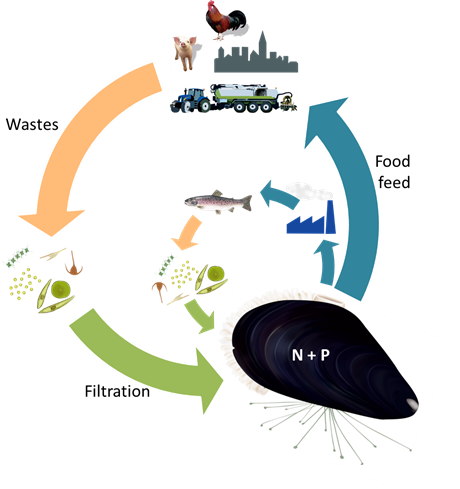Background
Harnessing the full potential of the “blue economy” is seen today as one of the most promising means to boost growth, employment opportunities and competiveness. In marine systems like the Baltic Sea that already are heavily exploited and subject to multiple anthropogenic pressures, it is of key importance for the long-term sustainability of the blue growth that it does not add to the pressure factors.
Aquaculture of extractive species like mussels and seaweed is an example of a blue growth potential that will not add to the pressure on the Baltic ecosystem but in contrast has the potential to mitigate some of the effects of excess load of nutrients. Thus, farming mussels intends to remove nutrients from the aquatic environment based on a mass balance perspective in the recipient water body thereby creating a truly circular economy.
As mussels farmed in most of the Baltic are unsuitable for human consumption due to their small size, BONUS OPTIMUS will document mussel meal as an alternative protein source to replace fish and soybean meal as a component in diets for fish. There is a worldwide demand for alternative and more sustainable fish feed in the aquaculture industry.
Aquaculture of mussels has the largest potential in relation to production volume, economic potential and sustainability in eutrophic system thereby contributing substantially to blue growth in the Baltic. To fulfil the potential, research and development of mussel aquaculture is needed on several levels: documentation of production potential, extent of the environmental goods and services delivered, environmental impact below farms and how mussel farming can fit in the coastal zone and achieve social acceptance.

Basic concepts of the BONUS OPTIMUS project: mussel mitigation cultures for fish feed in the Baltic Sea.
Challenges
Several attempts have been made to grow mussels in various parts of the Baltic, most of them with mixed results.
Growing mussels in the central part of the Baltic is challenged by low salinities not in favour of mussel production but also by very little local experience in growing mussels.
Another challenge for mussel production is to obtain production permits due to the lack of space in a heavily exploited coastal zone and the concerns raised about the environmental sustainability of mussel production especially with regard to the organic loading below the farms and the associated consequence of nutrient regeneration.
On the other hand, the goods and services provided by mussel farming in the Baltic has not been documented and so far the main focus has been on documentation of the potential of returning nutrients back to land through harvesting of the mussels. Mussel farming may however have more impact on environmental quality of the coastal waters through improvements of light penetration in water caused by mussel filtration of particulate matter. The challenges for mussel aquaculture may thus be balanced by potential improvements in environmental quality of the coastal waters gained through mussel aquaculture.